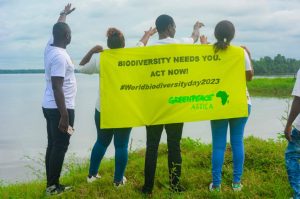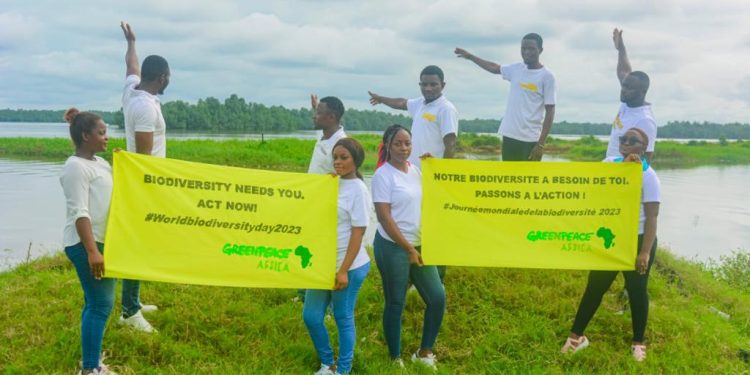PRESS RELEASE
Yaounde, May 23 2023: Africa joined the international community to celebrate
World Biodiversity Day under the theme “From Agreement to Action: Rebuilding
Biodiversity”.
For Greenpeace Africa, this theme is an invitation for Africa to break away from neo-colonial systems based on extractivism and turn to alternative development models which focus on ecology and community.
Threat to biodiversity is a reality. Under the Convention on Biological Diversity was adopted in Montreal, Canada, in 2022, during COP15, the Kunming-Montreal Global Biodiversity Framework” (GBF). The GBF contains a set of 23 goals that are key for biodiversity protection.
“Without such action, there will be a further acceleration in the global rate of species extinction,which is already at least tens to hundreds of times higher than it has averaged over the past 10 million years,” said Dr. Oulie Keita, Executive Director of Greenpeace.
Africa Biodiversity provides ecological goods and services that ensure the survival of indigenous people and local communities. These include flood control, water supply and purification, non-timber forest products (NWFPs) and medicinal plants, which continue to be widely used.
Greenpeace Africa recognises the role of nature and biodiversity in protecting human health, livelihoods and the extreme devastation of climate inaction. In May 2023, floods in eastern DRC left more than 430 people dead and thousands homeless. In Cameroon, the government recently acknowledged in a statement that more than 3 million Cameroonians are food insecure due in part to climate change. From Nairobi to Dakar, Pretoria, Kinshasa and Yaoundé, the impacts of the climate crisis on human life and biodiversity loss is palpable.
“The unfortunate incidents we have witnessed on the continent in recent weeks are a strong signal that nature is sending to us to make us aware of the disastrous effects that our actions have on it,” adds Dr. Keita.
“This year’s theme is a call for collective action. Greenpeace Africa will continue to work alongside African leaders to dismantle and expose the neo-colonial systems that seek to destroy Africa’s biodiversity under the guise of development. Corporations are interested in profits over people and are willing to
destroy biodiversity for their selfish interests. This development model has already shown its limits and does not guarantee a healthy ecosystem for future
generations. There is no use developing an economy for a dead planet,” said Dr.
Keita.
Africa has the potential to ensure a just and equitable future for generations to come. But the continent remains locked in an economic model based on extraction which drives biodiversity loss. Industrial logging leading to deforestation, overfishing by super trawlers, fossil fuels expansion and the
plastics pollution crisis are widespread on the continent.

“We cannot do the same thing over and over and expect different results. Africa can and must chart a different path, a new model of development that takes into account environmental justices in a practical way. Greenpeace Africa stands in solidarity with communities and partners demanding a new economic system that puts the well being of people and the planet at the centre. ” concluded Dr Keita.
Biodiversity it should be noted is of vital importance for the whole world. According to the United Nations, fish provides 20% of protein for at least 3 billion people and is a critical
part of the livelihoods of countless coastal fishing communities. 80% of the rural population of developing countries are treated with traditional medicines (whose resources are available mainly in the forest) and about 80% of the food of
humanity is provided by plants. It is essential that protecting biodiversity is at the core of all thinking by governments across the continent when making plans for economic development.
Contacts
pressdesk.africa@greenpeace.org
Luchelle Feukeng, Communications Officer, Greenpeace Africa
Email: lfeukeng@greenpeace.org
Phone: +237 656 46 35 45 (WhatsApp)








